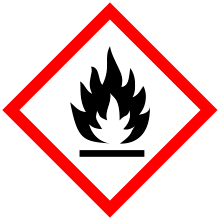Flammable liquid


Generally, a flammable liquid is a combustible liquid that can easily catch fire. However, it is not the liquid itself that burns, but the vapor cloud above the liquid that will burn if the vapor's concentration in air is between the lower flammable limit (LFL) and upper flammable limit (UFL) of the liquid.
Definitions
A number of attempts have been made to standardise the definition of 'flammable' based on the need to classify such fluids as presenting a higher risk of ignition and therefore needing additional precautions.
In the US, a flammable liquid is defined as one with a flash point below 100 degrees Fahrenheit (38 degrees Celsius). This definition is part of a categorisation of combustible liquids used by the National Fire Protection Association, The US Department of Transportation, the US Environmental Protection Agency, the US Occupational Safety and Health Administration and others.
These categories are further subdivided, depending on the liquid's flash point and boiling point.
- Class IA flammable liquids have a flash point below 73 °F (22.8 °C) (the upper end of the common range of room temperature) and a boiling point below 100 °F
- Class IB flammable liquids have a flash point below 73 °F (22.8 °C) and a boiling point greater than or equal to 100 °F (37.8 °C)
- Class IC flammable liquids have a flash point greater than or equal to 73 °F (22.8 °C) and below 100 °F (37.8 °C)
- Class II combustible liquids have a flash point greater than or equal to 100 °F (37.8 °C) and below 140 °F (60 °C)
- Class IIIA combustible liquids have a flash point greater than or equal to 140 °F (60 °C) and below 200 °F (93.3 °C)
- Class IIIB combustible liquids have a flash point greater than or equal to 200 °F (93.3 °C)